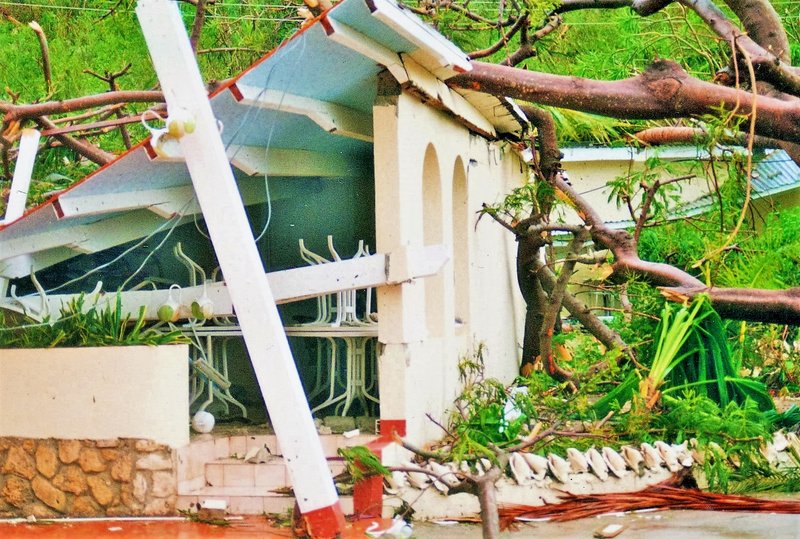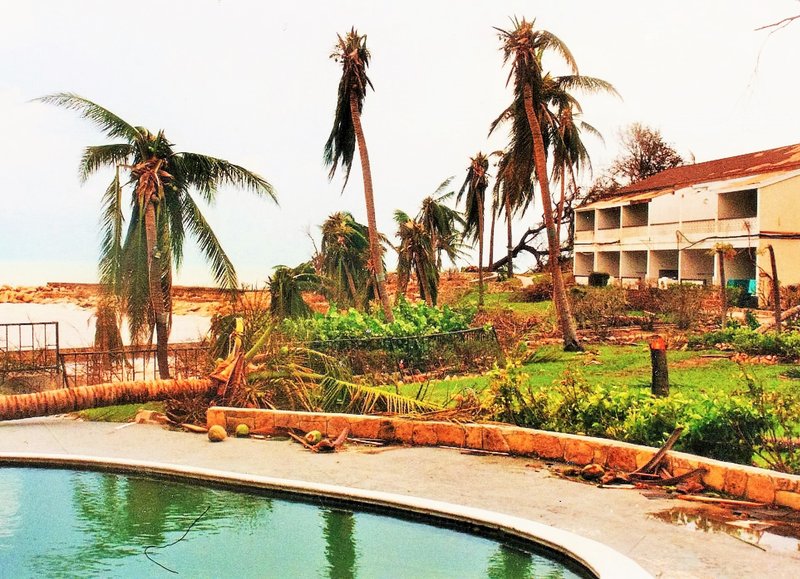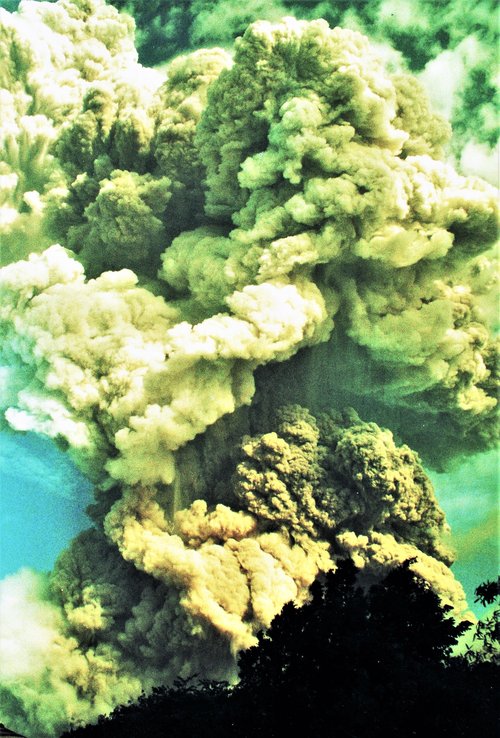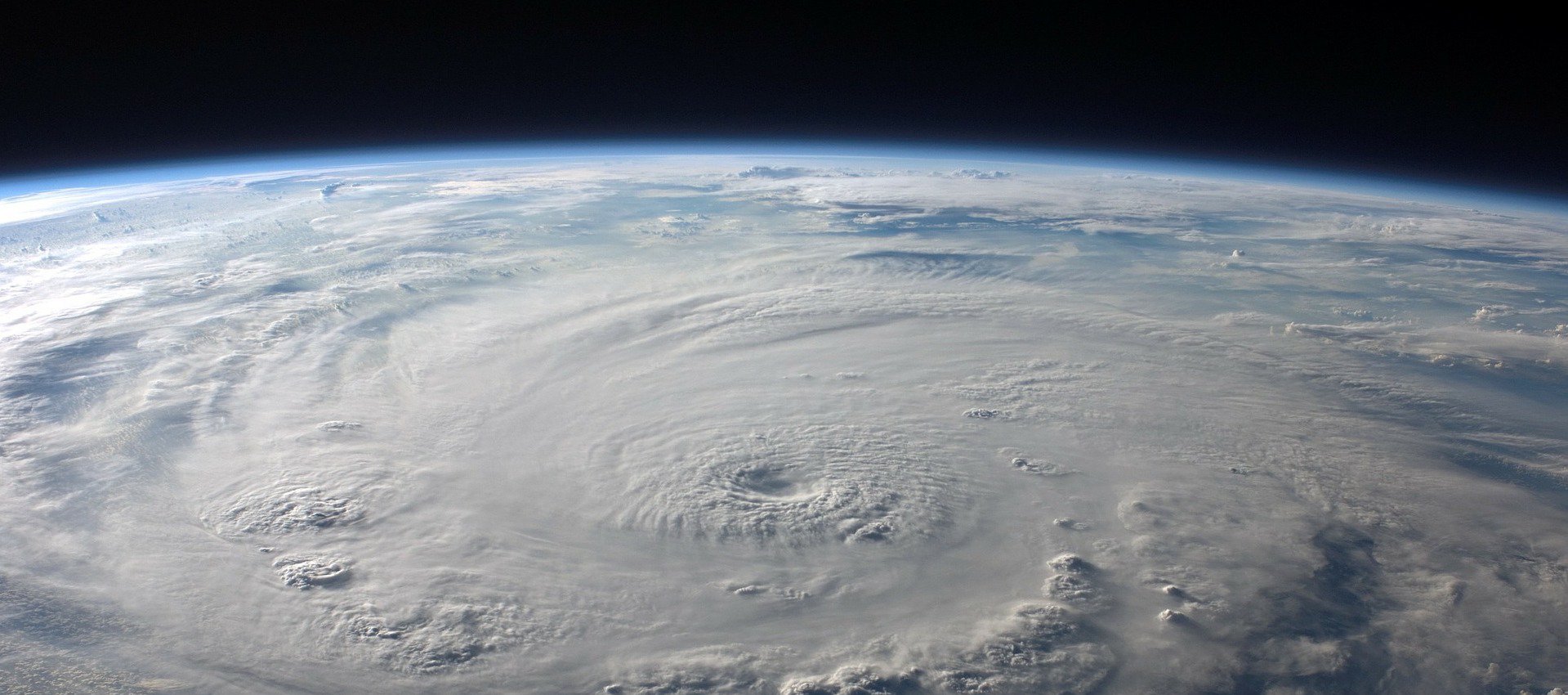On 4th September 1995, Hurricane Luis swept over the islands of the eastern Caribbean. Ordered to evacuate away from volcanic eruptions in Montserrat, Author Lally Brown and her family had been flown to Antigua, now directly in the path of the category 4/5 storm. In this guest blog post and excerpt from her new book The Volcano, Montserrat and Me, Lally writes of their epic ordeal surviving the strongest and deadliest tropical storm of the 1995 hurricane season.
Today, as Hurricane Irma passes over Florida and many Caribbean islands work to recover in the aftermath of this modern-day disaster, Lally's story serves as a powerful insight into the reality for people living through tropical storms and in multi-hazard environments.
From The Volcano, Montserrat and Me, by Lally Brown:
Early on Sunday 3rd September I was sitting on my bed in the Blue Waters Hotel listening to ZJB Radio Montserrat, hoping to get an up-date on the volcano, when the broadcast was interrupted with an important weather bulletin.
A hurricane watch had been advised for Antigua, Barbuda, Montserrat, St. Kitts and Nevis. In the confusion of recent events I had almost forgotten that we were still in the hurricane season.
I looked outside and the sky was a brilliant blue, the sea looked calm and coolly inviting and the sun blazed down in delicious warmth. It was hard to believe something very nasty was apparently brewing to the east of Antigua.
The Miami Weather Centre was tracking what had begun as a baby tropical wave formed in the hurricane nursery off the West coast of Africa. Conditions were perfect for a rapid acceleration of growth and over a few days the warm sea fed the insatiable appetite of the system until it grew into a tropical depression.
As it moved slowly west towards the Caribbean islands the tropical depression quickly graduated to tropical storm status and was awarded the name “Luis”.

With one wall totally missing and the side window out, the room was instantly exposed to the fierce wind and driving rain.
The spinning winds increased still further and Luis matured into a full-blown hurricane. The winds gathered even more speed over the warm sea of open Atlantic until finally the vast, awe-inspiring system was accorded the ultimate distinction “Dangerous Hurricane Luis” and alarmingly it was heading straight for Antigua and Montserrat.
A hurricane surveillance aircraft was sent out from Puerto Rico to inspect the monster. The crew brought their plane back to Antigua and found themselves billeted at the Blue Waters Hotel with us. They told us that they had rarely seen such a vast disturbance out in the ocean, it was “a whopper”. It would take twenty four to thirty hours to pass over Antigua and unless the plotted course changed dramatically overnight this dangerous hurricane appeared to be aiming directly for Montserrat.
First the volcano and now this huge hurricane “a double whammy” commented a very subdued radio announcer.
At first the Blue Waters Hotel did not seem to be taking the advancing hurricane particularly seriously. The Manager reminded me that they had weathered Hurricane Hugo in September 1989 and assured me that the worst we would get were strong winds and heavy rain for a few hours “coming from the northeast”. He insisted that our suite on the end of the south-east facing block was well protected.
I was not convinced. I squirreled away some yoghurts, bananas and bread rolls from the breakfast table. “A form of kleptomania” said my son. “Contingency planning!” I retorted.
I begged a roll of sticky tape from the front Reception Desk and we decorated the window, a wall of plate glass, with huge diagonal stripes to prevent splintering glass from flying around.
The two boys dragged in the patio furniture and pushed everything against the back wall of the lounge, well away from the glass wall. They pillaged the hotel games room and returned triumphantly clutching a box of Monopoly. We filled the bath with water, packed away our clothes and sealed them into plastic bags. We were ready for anything.
As the hurricane crept closer on the morning of Monday 4th September the Manager informed guests that a buffet lunch would be provided before facilities closed down at 2.00 p.m. The hotel planned to re-open twenty four hours later during the afternoon of Tuesday 5th September. They gave us two night candles, a beef sandwich and told us to stay in our rooms until the hurricane had passed.
The sea brought the first sign. Throughout the morning it had been gently, slowly, quietly changing. First, subtle little furrows appeared and before long whitecaps laced the surface, popping and rippling in the stiffening breeze. Soon the growing waves formed large undulating rollers that burst with a crash against the shore.
The tall coconut palms began to lean with the strengthening wind, their fronds rustling, alternately fluttering free or straining tensely as the gusts caught. In the next room an RAF policeman settled down and prepared to read his way through a book while the RAF Hercules disappeared off to ride out the hurricane in the US. By 3.00 p.m. we had holed up in our suite and the boys had begun a game of Monopoly.

We had to use the swimming pool, green and thick with debris and the roots of a fallen palm, to wash the crockery.
The phone lines and electricity went down almost immediately. As the afternoon progressed the wind increased bringing with it heavy rain. Watching through the window our visibility was reduced to a few metres and our view of the now foaming, crashing sea was restricted by a seemingly solid wall of thick grey mist. The palm trees were swinging and writhing, whipped almost horizontal by the buffeting wind.
As the hours passed the storm grew more ferocious. We had to shout to each other above the noise in order to make ourselves heard. The changing air pressure hurt our ears and we put in earplugs and opened a small window on the opposite side to the wind direction.
I abandoned the bedroom at 1.30 a.m. when the corner of the roof began to lift. Rain hammered down and water was already pouring through like a river from the enclosed balcony outside. The stairs from the bedroom became a waterfall that streamed into the lounge, backing up and swilling inches deep around our feet.
The boys climbed onto the couch and I paddled into the tiny kitchen and climbed up onto the work surface and stretched out with a pillow. In the inky blackness the whole building was vibrating. It shuddered and groaned with the onslaught of Dangerous Hurricane Luis. Glass in the windows was splattered with seaweed and flexed and bent under the pressure. A solar panel complete with corrugated cover had been wrenched from a neighbouring roof and wedged itself outside our door, crashing and banging, adding to the already deafening noise.
Coconuts, ripped from the savaged palms, smashed like grenades into the walls. My perch in the kitchen became saturated with water seeping in from the adjacent window and from somewhere above my head. At 4.30 a.m. I waded my way back into the lounge to join the boys.
At 7.30 a.m. there was the briefest of respites when the furious wind seemed to slow and pause for a few minutes. We were on the wall of the eye of the hurricane and so did not experience that extraordinary silence and blue sky which accompanies the passage of the ‘eye’. Then suddenly, abruptly, the wind direction changed completely and came screaming in from the opposite direction.
Our vulnerable suite took the full brunt. The winds, stronger than ever and gusting to 140 mph, slammed into our wall. A loud crash came from the kitchen as a piece of wood demolished the window and ripped out the frame. Glass, frame and wood smacked into my recent bed. Thank God I had moved into the lounge. It took all the strength they could muster for the two boys to pull the kitchen door closed against the wind and stinging rain.
The boys were fascinated by the power and destructive force of the hurricane and from time to time peered through the window saying “Cool!” “Wow!” “Awesome!” and occasionally shouting over their shoulder to me “Hey! ... Come look at this!”
They had just sloshed back to the couch when there was another terrific bang, like an explosion, and in rapid succession the side window in the lounge blew in and the complete wall of glass on the opposite side blasted out like a massive champagne cork. So much for our attempts with the sticky tape.
With one wall totally missing and the side window out, the room was instantly exposed to the fierce wind and driving rain.
It was an astonishing sight to see everything in the room whisked into the air, blown around and then disappear out into the wild world. Books, papers and the Monopoly game with a million bank notes, whirled dizzily and vanished.
My son tried to grab a chair as it slid towards the gaping hole where the wall should have been, but as he lifted it into the air the wind plucked it from his arms and sucked it out into the storm. We pressed ourselves against the back wall and for a few moments just watched in stunned amazement. Then the roof began to pop ominously and we beat a hasty retreat.
The communicating door to the adjacent suite was locked, but with three good kicks it gave way, and we tumbled in to join a surprised, and naked, RAF policeman. Under the circumstances he was extremely gracious and welcomed us in before disappearing off to the bathroom to make himself respectable.
Although it was flooded his room had escaped severe damage and we spent the next seven hours sitting on his bed, eating our beef sandwiches, and chatting, while the hurricane blew itself out and on its way up the Caribbean chain.
As the winds diminished we emerged to inspect the damage and discovered that the Blue Waters Hotel as we had known it no longer existed. It had been completely devastated. Parts of the hotel had simply disappeared. Roofs were off, windows and walls blown out, palm trees uprooted and tossed into the swimming pool. Rooms were flooded and the grounds were a sodden, muddy quagmire. Fallen trees thick with impenetrable foliage blocked the roads out.
We were isolated and trapped unable to get out of the area. There was no phone, no water, no power and very little food. The hotel was a disaster area and sixty guests were stranded inside.
Mercifully for Montserrat the hurricane had veered away at the last minute and the island escaped with only heavy rain and strong winds that caused mountainous seas, damage to the jetty, a few tents down, and a couple of roofs lost. But Antigua and Barbuda had taken the full impact, suffering terribly as a consequence. As it carved a destructive path north Dangerous Hurricane Luis also decimated the island of St. Maarten.

We heard an accompanying loud ‘boom’ from outside. We went into the garden and watched as the volcano blew a vacuum bag of dust 6,000 ft. into the air.
The airport was closed for two days, the perimeter fence down and the control tower damaged and exposed to the elements.
In Antigua things began to deteriorate rapidly. A curfew was imposed to try and stop the looting. At the Blue Waters Hotel with no immediate help forthcoming the guests turned mutinous. For two nights the boys and I camped out as best we could in rooms slightly less destroyed than our own. Scavenging, I found some rice in one wrecked and abandoned suite, re-connected a gas cylinder and managed to make them a sort of meal.
We had to use the swimming pool, green and thick with debris and the roots of a fallen palm, to wash the crockery. The trapped water around the site began to smell offensively. It became evident that if we wished to escape we would have to help ourselves.
We heard that the RAF Hercules was returning from Washington, calling in to Antigua, and would be leaving for Montserrat during the afternoon of 7th September. We decided that it would be better to return to Montserrat and the volcano than to remain under hurricane aftermath conditions at the Blue Waters Hotel.
At last, late on the morning of the 7th, the road from the hotel was partly cleared and it was possible to get through. We persuaded the Under Manager at the hotel to lend us his battered old car. We packed our bags and paid one of the workmen to drive us to the airport. It was a tortuous trip. He had to try all the back roads, weaving around fallen trees, driving over twisted power lines, corrugated sheeting and an assortment of hurricane garbage. The island looked as if it had been blasted by a meteorite. At one point the engine stalled and we spent an agonising few minutes wondering whether it would cough back into life again.
We finally reached the airport only to find that most of Antigua had been camped out there for two days, waiting for the planes to begin flying. A mass of tired, dishevelled, disgruntled people heaved around the empty airline desks.
The RAF Hercules had indeed arrived and we found the crew, only to discover that the aircraft needed refuelling, and the fuel at Antigua was suspected of being contaminated with water. The crew decided to “sit and wait for it to settle”, which meant waiting until the following day and sleeping rough at the airport.
We were sitting on our suitcases trying to come to terms with this news when we were spotted in the crowd by an Antiguan friend. She pushed her way through the melee to talk to us. She had connections with LIAT and informed us that an Otter aircraft with about twenty passengers was about to take off for Montserrat, the first flight to leave Antigua since before Hurricane Luis. We leapt at the chance to get on board. Fortunately I had cash in my bag and a surreptitious exchange of cash for tickets took place and by some extraordinary miracle we were suddenly being hustled, running, through a deserted Departure lounge out onto the airport apron and bundled into the waiting Otter. The door was closed behind us.
As we throbbed down the runway, wobbled a little uncertainly, then lifted off, the boys began to sing “Show Me The Way To Go Home” and generously handed out miniatures of rum, whisky and gin to the other passengers. The atmosphere on board was magic. It was a great relief to have left Antigua behind and fifteen minutes later, as the runway of Montserrat came into sight, a spontaneous loud cheer went up.
As we landed the Governor walked across the
tarmac to greet us. In his official car he had brought a cooler full of
ice-cold beer. We thought we were in heaven. He took us to his home for a
supper of pizza and apple pie, and we celebrated with a glass of champagne. As
the cork popped we heard an accompanying loud ‘boom’ from outside. We went into
the garden and watched as the volcano blew a vacuum bag of dust 6,000 ft. into
the air, which drifted slowly north with the prevailing wind. “A welcome home from the volcano!” said
the Governor.
You can find the full text of Lally's Book on Amazon:
The Volcano, Montserrat and Me
Eyewitness account of life with an erupting volcano on the Caribbean island of Montserrat from the first day of the eruption in July 1995 and three years of subsequent eruptions as the volcano became more deadly and dangerous.
